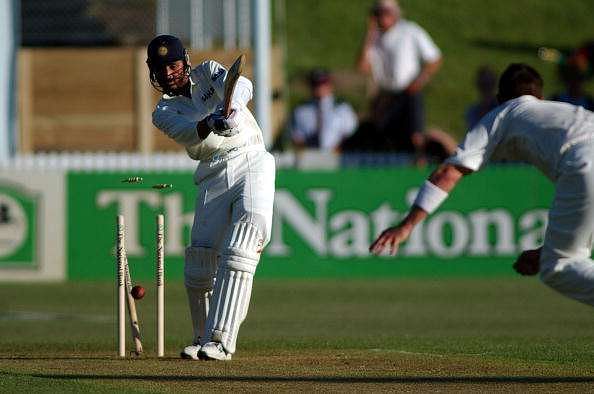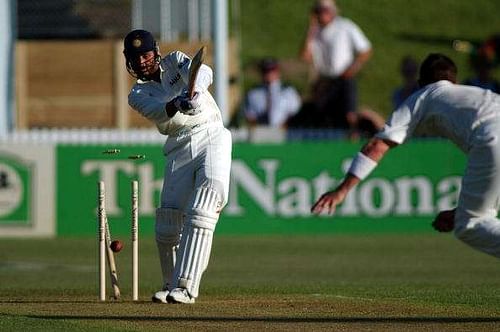
A day in Hamilton when 22 wickets fell on the 22 yards
The scoreboard read 99, 94 and 154. On any other normal day of Test cricket these would have been the scores of three batsmen. But December 21st, 2002 was no normal day in Test cricket, for it saw the fall of 22 wickets at the Westpac Park in Hamilton. 279 runs were scored between this mayhem shared over four different innings.
The above three numbers were actually runs scored by the entire Indian and New Zealand team in three innings. With day one and a good part of day 2 lost due to rain, India had resumed their first innings on day 3 at a sorry state of 92 runs for the loss of 8 wickets.
It took just three balls to see the back of the overnight Indian wicket-keeper batsman, a 17-year-old Parthiv Patel. Number 10 batsman Ashish Nehra did hit a six before perishing to Shane Bond and the Indian first innings had come to an end one run short of a century.
Wickets and records tumble
The Kiwis would have thought that a big first innings lead was there for the taking; not even in their worst nightmares would they have thought of conceding a lead to the Indians. But as they say, cricket is a game of glorious uncertainties; the New Zealand innings folded for 94 runs in 38.3 overs, thus giving the Indians a lead of 5 runs.
Zaheer Khan was the chief destroyer and took five Kiwi wickets. He was well supported by Ashish Nehra and Harbhajan Singh, both of whom took 2 wickets each. For the Kiwis, skipper Stephen Fleming top scored with 21 runs.
This was the first time in Test cricket that both teams had scored less than 100 runs in their first innings. It was also the first time that a team scoring less than 100 runs had got a first innings lead. Already 12 wickets had fallen in the day, but little did we know that the future had more wickets in store for us.
A ray of hope for the Indians
At the end of the two innings the Indians, who had lost the first Test match by 10 wickets, seemed in good position to draw level in the series. The Indian think-tank decided to push flamboyant opener Virender Sehwag down the line-up in order to give him more freedom to play his strokes. This meant that the young Parthiv Patel had to open the innings.
However, Daryl Tuffey got the better of Patel in the second over of the innings before the latter had even opened his account. And when Sanjay Bangar fell in the sixth over, the Indian scorecard read 8 runs for the loss of 2 wickets.
Tuffey and Oram ensure a smallish target for the Kiwis
In the middle were Rahul Dravid and Sachin Tendulkar, undoubtedly India’s two most technically accomplished batsmen. For the next hour or so, it seemed that the two would rescue India, just as they had often done in the past.
But the Indian dreams were shattered when Tendulkar played on to a delivery from Tuffey. Soon after, Indian skipper Sourav Ganguly and crisis man VVS Laxman followed Tendulkar back to the pavilion.
Sehwag did justify the decision to drop him down the order by scoring a quick-fire 25 runs off 18 balls. But wickets kept falling at regular intervals and the Indian innings finally ended at 154, setting the Kiwis a target of 160 runs. Dravid was the top scorer with 39 runs to his name. Tuffey and Jacob Oram accounted for 8 Indian wickets and had identical figures of 4 wickets for 41 runs.
The New Zealand openers Mark Richardson and Lou Vincent ensured that the day ended without any further addition to the wickets column.
In terms of the all-time record for the most number of wickets to fall on a single day in Test cricket, this day had found a place in the top 10. For the record, the highest number of wickets to fall on a single day is 27, which happened at Lord’s in a match between England and Australia in 1888.
A match report in Cricinfo aptly summarised that Tsunamic day in Hamilton - “Traditionalists might wonder whatever happened to good, old-fashioned technique? It was nowhere in evidence on either side, no matter what the reputations of the players concerned.”
Conditions were definitely difficult for batting. But mind you, the match had players of great repute like Tendulkar, Dravid, Laxman, Nathan Astle and Craig McMillan among others. I guess it was just one of those days when it rained wickets instead of runs.
Coming back to the match, the Kiwis overcame the challenge posed by the Indian attack and reached their target with the loss of six wickets. Fleming once again top-scored for the Kiwis and made 32 valuable runs. Tuffey was adjudged as the man of the match for his haul of eight wickets.
